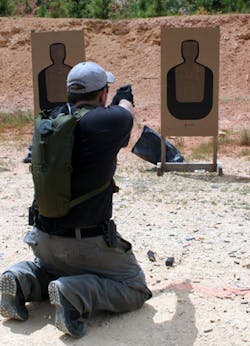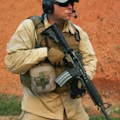Well, we've always done it like that. If I hear that excuse one more time I think my head might explode. I've been in the "gun game" for more than two decades now as a student and instructor at firearms and tactics schools.
No one starts out as the teacher or instructor, we all began as students, plebes, rookies, cadets, you name it. When you are a rookie you do what you are told. No questions, no ifs, ands, or buts. However, as we grow and develop in our career field we should begin to apply something simple yet apparently elusive; analytical thinking.
The Crutch
Too many of those charged with firearms training for the new troops fall back on the old we've always done it that way crutch. This excuse apparently frees them from the need to think.
During the last three years I've been working at military training command. My job is to teach small arms and tactics to troops preparing for overseas deployment. When I started working closely with the existing instructor corps, I found that their pistol training program was ten to fifteen years behind progressive law enforcement training. Inquiring as to why certain things were done, the most common answers were That's the way we've always done it Or That's the way they want it taught.
A police agency I once worked with required its officers to annually pass the state mandated firearms course. Invariably, year after year, somewhere between twenty-five and thirty percent of the officers failed to qualify the first time through the course and had to be remediated. A simple question was posed. If such a high percentage of people can’t pass the qualification the first time through, shouldn't we mandate extra training time and ammunition? The answer was No, this is the way we've always done it.
Rather than examine or address any deficiencies in the curriculum or training program, it's much easier to simply state, that's we way we've always done it. Well that's great. We used to bore holes in people's head to let the demons out. I'm sorry folks but we've always done it like that is a crutch. It's an easy way out that requires no thought or effort.
Changing World
For decades we dealt with In-Progress Felonies the same way. The first units on scene surrounded the building to prevent escape. The SWAT team was called out and arrived in thirty minutes to an hour, maybe. A negotiator made contact with the criminal(s) and only after all communications had broken down did we consider action. Worked great for years until the world changed.
On April 20th, 1999, two pieces of spoiled suburban teenage feces walked into a school in Columbine, Colorado and opened fire on the innocent. They weren't there to rob a bank, commit a kidnapping or demand the release of their "comrades" from prison. They wanted to kill. On that day the law enforcement template for "In-progress Felonies" was the same as it had been for decades; Surround, Call Out, Negotiate.
No, I'm not Monday-Morning Quarterbacking. I'm simply pointing out that the world had changed. The old playbook was no longer relevant. The fact that we've always done it that way didn't make a damn bit of difference as the cowardly maggots went on a murder spree.
Fortunately, after the Columbine incident many agencies did rethink their policies and developed Active Shooter doctrines and training to go along with it. Unfortunately just as many agencies/ departments did not make any changes to their training. I have worked for L.E. agencies that still have the "Surround, Call Out, Negotiate" policy, but no active shooter doctrine.
Think About It
I know that it goes against every bureaucratic instinct known to man, but every once in a while we need to actually think about why it is we do what we do. I'm not telling you to reinvent the wheel here. However, periodically we need to examine our firearms training programs and S.O.P.s Are we preparing our men and women for the realities of the street or simply some artificial scenario we constructed on the square range?
If you are in charge of your department's firearms training program take a look at your approved course manual. When was the last time it was updated? Are you even teaching what is in the book? It could be that your program has evolved but your material doesn't reflect it. Are you teaching tactics that are proven and practical or are you simply teaching what's been in the book for the last thirty years?
Too many lawmen look at a Range assignment as a place to chill out or skate for awhile. They follow the old playbook, push their students through, and collect a paycheck. Is the material you are providing them up to date and practical or are you simply going through the motions and doing what's always been done? The choice is up to you.
About the Author
Paul Markel
Mr. Markel is a former United States Marine, Police Officer, and has worked as a professional bodyguard both in the U.S. and overseas. A Subject Matter Expert on Small Arms and Tactics, Markel has provided instruction to law enforcement and U.S. Military troops.
As a recognized author and writer, Paul has penned several hundred articles published in numerous professional journals and trade periodicals. Topics include firearms training, use of force, marksmanship, less-than-lethal force options, product reviews and evaluations, emergency medical care, and much more. Sought after as a public speaker, Mr. Markel is at home in front of an audience large or small.
Follow Mr. Markel's instructional show: http://www.studentofthegun.com

